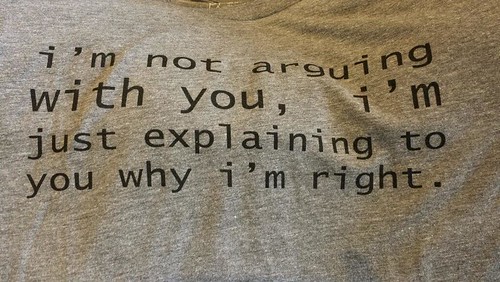The Science of Why We Don't Believe Science
" "
"
"A MAN WITH A CONVICTION is a hard man to change. Tell him you disagree and he turns away. Show him facts or figures and he questions your sources. Appeal to logic and he fails to see your point." So wrote the celebrated Stanford University psychologist Leon Festinger (PDF), in a passage that might have been referring to climate change denial—the persistent rejection, on the part of so many Americans today, of what we know about global warming and its human causes. But it was too early for that—this was the 1950s—and Festinger was actually describing a famous case study in psychology.
Festinger and several of his colleagues had infiltrated the Seekers, a small Chicago-area cult whose members thought they were communicating with aliens—including one, "Sananda," who they believed was the astral incarnation of Jesus Christ. The group was led by Dorothy Martin, a Dianetics devotee who transcribed the interstellar messages through automatic writing.
Through her, the aliens had given the precise date of an Earth-rending cataclysm: December 21, 1954. Some of Martin's followers quit their jobs and sold their property, expecting to be rescued by a flying saucer when the continent split asunder and a new sea swallowed much of the United States. The disciples even went so far as to remove brassieres and rip zippers out of their trousers—the metal, they believed, would pose a danger on the spacecraft.
http://www.motherjones.com/politics/2011/03/denial-science-chris-mooney
longship
(40,416 posts)I can imagine the activity when the moment approaches.
Now that's funny!
![]()
What if one has a metal plate in ones head? Or their hip. Guess they're screwed.
At least it wasn't Hale-Bopp.
RainDog
(28,784 posts)is based upon who they know and/or trust.
The reality is there are many subjects we cannot or do not know enough about to make adequate judgments sometimes. In those cases, adults have to rely on those they think are more reliable when information conflicts. But prior to adulthood, we come with some pre-conceived notions based upon our physical experience of the world. These ideas can be changed by direct experience, even when the outcome is "counter intuitive" to expectations based upon perceptual "intuition." The idea that the mind and brain are two different things is also part of our childhood understanding - the physical brain and the imagination are seen as two different things. Duality seems to fall into "intuitive perception" that's misleading as well.
http://edge.org/conversation/why-do-some-resist-science
The developmental data suggest that resistance to science will arise in children when scientific claims clash with early emerging, intuitive expectations. This resistance will persist through adulthood if the scientific claims are contested within a society, and will be especially strong if there is a non-scientific alternative that is rooted in common sense and championed by people who are taken as reliable and trustworthy. This is the current situation in the United States with regard to the central tenets of neuroscience and of evolutionary biology. These clash with intuitive beliefs about the immaterial nature of the soul and the purposeful design of humans and other animals — and, in the United States, these intuitive beliefs are particularly likely to be endorsed and transmitted by trusted religious and political authorities. Hence these are among the domains where Americans' resistance to science is the strongest.
...The main source of resistance to scientific ideas concerns what children know prior to their exposure to science. The last several decades of developmental psychology has made it abundantly clear that humans do not start off as "blank slates." Rather, even one year-olds possess a rich understanding of both the physical world (a "naïve physics"![]() and the social world (a "naïve psychology"
and the social world (a "naïve psychology"![]() . Babies know that objects are solid, that they persist over time even when they are out of sight, that they fall to the ground if unsupported, and that they do not move unless acted upon. They also understand that people move autonomously in response to social and physical events, that they act and react in accord with their goals, and that they respond with appropriate emotions to different situations.
. Babies know that objects are solid, that they persist over time even when they are out of sight, that they fall to the ground if unsupported, and that they do not move unless acted upon. They also understand that people move autonomously in response to social and physical events, that they act and react in accord with their goals, and that they respond with appropriate emotions to different situations.
These intuitions give children a head start when it comes to understanding and learning about objects and people. But these intuitions also sometimes clash with scientific discoveries about the nature of the world, making certain scientific facts difficult to learn. As Susan Carey once put it, the problem with teaching science to children is "not what the student lacks, but what the student has, namely alternative conceptual frameworks for understanding the phenomena covered by the theories we are trying to teach."
Our intuitive psychology also contributes to resistance to science. One significant bias is that children naturally see the world in terms of design and purpose. For instance, four year-olds insist that everything has a purpose, including lions ("to go in the zoo"![]() and clouds ("for raining"
and clouds ("for raining"![]() , a propensity that Deborah Kelemen has dubbed "promiscuous teleology." Additionally, when asked about the origin of animals and people, children spontaneously tend to provide and to prefer creationist explanations.
, a propensity that Deborah Kelemen has dubbed "promiscuous teleology." Additionally, when asked about the origin of animals and people, children spontaneously tend to provide and to prefer creationist explanations.